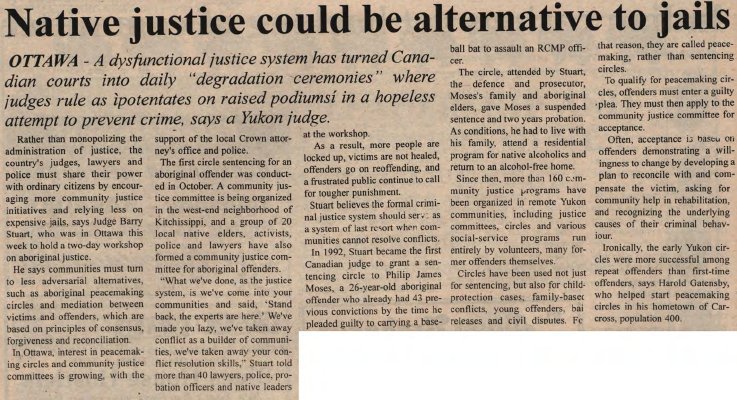"Native justice could be alternative to jails"
- Publication
- Turtle Island News, 17 Dec 1997
- Full Text
- Native justice could be alternative to jailsOTTAWA - A dysfunctional justice system has turned Canadian courts into daily "degradation ceremonies" where judges rule as ipotentates on raised poduiumsi in a hopeless attempt to prevent crime, says a Yukon judge.
Rather than monopolizing the administration of justice, the country's judges, lawyers and police must share their power with ordinary citizens by encouraging more community justice initiatives and relying less on expensive jails, says Judge Barry Stuart, who was in Ottawa this week to hold a two-day workshop on aboriginal justice.
He says communities must turn to less adversarial alternatives, such as aboriginal peacemaking circles and mediation between victims and offender, which are based on principles of consensus, forgiveness and reconciliation.
In Ottawa, interest in peacemaking circles and community justice communities is growing, with the support of the local Crown attorney's office and police.
The first circle sentencing for an aboriginal offender was conducted in October. A community justice committee is being organized in the west-end neighbourhood of Kitchissippi, and a group of 20 local native elders, activists, police and lawyers have also formed a community justice committee for aboriginal offenders.
"What we've done, as the justice system, is we've come into your communities and said, 'Stand back, the experts are here,' We've made you lazy, we've taken away conflict as a builder of communities, we've taken away your conflict resolution skills," Stuart told more than 40 lawyers, police, probation officers and native leaders at the workshop.
As a result, more people are locked up, victims are not healed, offenders go on reoffending, and a frustrated public continue to call for tougher punishment.
Stuart believes the formal criminal justice system should serve as a system of last resort when communities cannot resolve conflicts.
In 1992, Stuart became the first Canadian judge to grant a sentencing circle to Philip James Moses, a 26-year-old aboriginal offender who already had 43 previous convictions by the time he pleaded guilty to carrying a baseball bat to assault an RCMP officer.
The circle, attended by Stuart, the defence and prosecutor, Moses's family and aboriginal elders, gave Moses a suspended sentence and two years probation. As conditions, he had to live with his family, attend a residential program for native alcoholics and return to an alcohol-free home.
Since then, more than 160 community justice programs have been organized in remote Yukon communities, including justice committees, circles and various social-service programs run entirely by volunteers, many former offenders themselves.
Circles have been used not just for sentencing, but also for child protection cases, family-based conflicts, young offenders, bail releases and civil disputes. For that reason, they are called peacemaking, rather than sentencing circles.
To qualify for peacemaking circles, offenders must enter a guilty plea. They must then apply to the community justice committee for acceptance.
Often, acceptance is based on offenders demonstrating a willingness to change by developing a plan to reconcile with and compensate the victim, asking for community help in rehabilitation, and recognizing the underlying causes of their criminal behaviour.
Ironically, the early Yukon circles were more successful among repeat offenders than first-time offenders, says Harold Gatensby, who helped start peacemaking circles in his hometown of Carcross, population 400.
- Media Type
- Text
- Newspaper
- Item Type
- Clippings
- Description
- "A dysfunctional justice system has turned Canadian courts into daily "degradation ceremonies" where judges rule as 'potentates on raised podiums' in a hopeless attempt to prevent crime, says a Yukon judge."
- Publisher
- Turtle Island News
- Place of Publication
- Six Nations of the Grand River, ON
- Date of Publication
- 17 Dec 1997
- Subject(s)
- Personal Name(s)
- Stuart, Barry ; Moses, Philip James ; Gatensby, Harold.
- Corporate Name(s)
- Royal Canadian Mounted Police.
- Local identifier
- SNPL005122v00d
- Language of Item
- English
- Geographic Coverage
-
-
Ontario, Canada
Latitude: 45.42094 Longitude: -75.69029
-
- Creative Commons licence
 [more details]
[more details]- Copyright Statement
- Public domain: Copyright has expired according to Canadian law. No restrictions on use.
- Copyright Date
- 1997
- Copyright Holder
- Turtle Island News
- Contact
- Six Nations Public LibraryEmail:info@snpl.ca
Website:
Agency street/mail address:1679 Chiefswood Rd
PO Box 149
Ohsweken, ON N0A 1M0
519-445-2954



